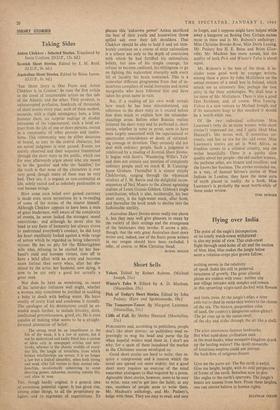SHORT STORIES
Taking Sides
Anton Chekhov : Selected Stories. Translated by Jessie Coulson. (O.U.P., 12s. 6d.) Scottish Short Stories. Edited by J. M. Reid. (O.U.P., 9s. 6d.) Australian Short Stories. Edited by Brian James. (O.U.P., 85. 6d.) THE Short Story is One Form and Anton Chekhov is its Creator.' So runs the first article in the creed of innumerable artists on this side of the Atlantic and the other. They produce, in uninterrupted profusion, hundreds of thousands of short stories every year, each of them modest, accurate, with a slight astringency here, a little humour there, no surprise endings or shoddy intrusions of the supernatural, each a brief ex- tract from the life of one or more persons, rooted in a community of other persons and institu- tions. This community may be either decorous or brutal, as may be the central character, but no moral judgment is ever passed. Events are merely observed and their sequence transmitted through the short story to the public, which can for ever afterwards argue about who are meant to be the 'goodies' and who the `baddies,' for the truth is that none of the characters is ever very good, though many of them may be very bad. They are, it is argued, as non-committal as life, subtly varied and as infinitely pardonable as real human beings.
How some such belief ever gained currency is made even more mysterious by a re-reading of some of the stories of the master himself. Although Chekhov appears to have been a man of great tenderness, well aware of the complexity of events, he never lacked the strongest moral convictions: and although he never shut his head to any form of humanity but always strove to understand everybody's conduct, he did keep his heart steadfastly locked against a wide range of action which he regarded as being inherently vicious. He has no pity for the flibbertigibbet wife who, refusing to be excited by her hus- band's staid and humane virtues, runs off to have a brief affair with an artist and becomes more furious than sorry when, after her dis- missal by the artist, her husband, now dying, is seen to be not only a good but actually a great man.
Nor does he have us wondering, as many of his latter-day imitators well might, whether a woman may sometimes be justified in scalding a baby to death with boiling water. He hates cruelty of every kind and condemns it roundly. The catalogue of his detestations could be ex- tended much further, to include frivolity, sloth, intellectual pretentiousness, greed, etc. He is even capable of making what seems to be a straight- forward attestation of belief: The strong must be an impediment to the life of the weak, it is a law of nature, but it can be understood and easily fitted into a system of ideas only in newspaper articles and text- books, whereas in the chaotic muddle of every- day life, the tangle of trivialities from which human relationships are woven, it is no longer a law but a logical absurdity, when both strong and weak alike fall victims to their mutual rela- tionships, involuntarily submitting to some directing power, unknown, standing outside life, and alien to man.
This. though hardly original, is a general idea of enormous potential vigour. It has given rise, among other things, to all the propitiatory re- ligions and to regiments of superstitions. To placate this 'unknown power' Aztecs sacrificed the best of their youth and housewives throw spilled salt over their left shoulders. That Chekhov should be able to hold it and yet stub- bornly continue on a course of strict rationalism is a tribute not only to the depth of conviction with which he had fortified his rationalistic beliefs, but also of his simple courage, his refusal to become confused, his willingness to go on fighting this malevolent obscurity with every bit of lucidity his brain contained. This is a somewhat different programme from that of in- dustrious compilers of social footnotes and moral marginalia who have followed him and have taken his great name in vain.
But, if a reading of his own work reveals how much he has been misunderstood, any reference to the short story as it existed before him does much to explain how the misunder- standings arose. Before other Russian realists initiated the short story and he perfected it, short stories, whether in verse or prose, seem to have been largely concerned with the supernatural or spectacular coincidences or deeds of outstand- ing courage or devotion. They certainly did not deal with ordinary people. Such a judgment is reinforced by a reading of Scottish Short Stories. It begins with Scott's 'Wandering Willie's Tale' and does not contain any mention of completely ordinary people until we reach R. B. Cunning- hame Graham. Thereafter it is almost strictly Chekhovian, ranging through the whimsical rivalries of J. M. Barrie and the delightful incon- sequences of Neil Munro to the almost agonising realism of Lewis Grassic Gibbon. Gibbon's single contribution, which is also, incidentally, his best short story, is the high-water mark, after Scott, and thereafter the book tends to decline into the fashionable sterility.
Australian Short Stories never really rise above it, but they may well give pleasure to many by the variety of their settings and the strangeness of the landscapes they invoke. It seems a pity, though, that the only great Australian short story writer and, indeed, one of the finest prose writers in our tongue should have been excluded. I refer, of course, to Miss Christina Stead.
BURNS SINGER






























 Previous page
Previous page